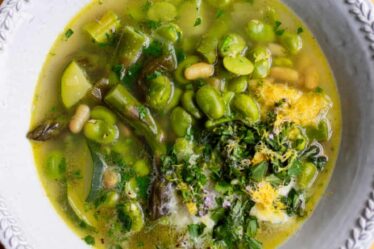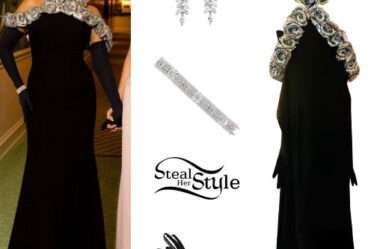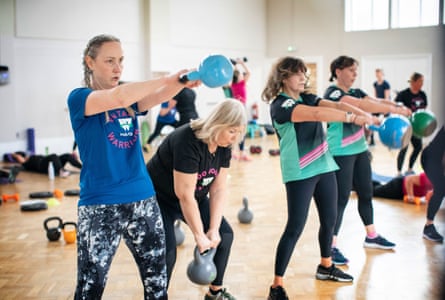
When 50-year-old Anna Jenkins, the founder of We Are Fit Attitude (Wafa), a woman-only health and fitness club, looked online for images of older women exercising, she was irritated by the pitiful size of the weights: the stock image is of a woman with grey hair lifting a 1kg weight, as if doing so were some kind of milestone. My personal bugbears are the photos in which there is a personal trainer with an expression of infinite patience next to the older woman, as if the latter is weak and half witted.
Stock photos are the internet’s idea of what the world should look like, sets of generic images intended to illustrate articles and advertising, often revealing more worldview than they probably set out to. There are famously a lot of photos of white women laughing near salad, meant for healthy eating content, but also reinforcing inane cheer and self-denial as cornerstones of femininity. If fitness imagery of the young is all about aspiration – six packs, muscle definition and impossible body fat percentages – fitness imagery of older people is almost anti-aspirational. Its message is: “You probably can’t do anything at all, but look over here, there’s a lady managing this tiny thing.”
Jenkins runs the Wafa classes remotely and in person for women ranging from their late 30s to their mid-70s. One Saturday, at a class in Merton, south London, they decided to create a new set of photos, repopulate the ecosystem of stock photographs, so that when you search for “older women exercising”, you will be able to see what that really looks like. “These are proper weights,” says Annette Hinds, 60. “We’re not pussyfooting about.”
Jenkins went into group work and coaching from personal training because she had noticed that, in the gym: “Women would go straight to the cardio machine because they knew how it worked. It’s a frightening environment when you think you don’t belong, when you’re unhappy in your body shape. But they didn’t need more cardio – at 45-plus your body needs strength work. Especially during the menopause. It’s just a fact.”
As your bones lose density, the only way you will protect them is by keeping your muscle mass; building strength in middle age is part of what will define the shape and tempo of your old age. But as Glenda Cooper, 51, who usually does this class remotely five times a week, says, there is more to it than that. “Women at this time of life have parents we’re caring for. I’ve got two kids. You don’t want to take up too much space, you feel invisible anyway, you don’t make time for yourself. It’s so important to have a sense of your own strength, which I think is absent from the rest of our lives.”
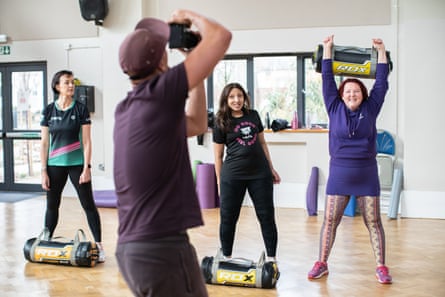
The photographer documenting today’s class, Jason Alfred-Palmer, is the son of one of the Wafa women, Hilary Palmer, 61. Methodically, unobtrusively, he catches the kettlebell swings, the slam balls in action, the planks, the radically enthusiastic press-ups. There is another cliche that is unlikely to survive this photoshoot: that middle-aged women are somehow less competitive than everyone else, happy to retreat to the sidelines.
Sure, it is extremely comradely. “Nobody here is going to tease me if I get out of step,” says 76-year-old Linda Redford, who has a really friendly manner and impressive upper-body strength. But there are all these things you are supposed to lose interest in, in your dusk to twilight years – punching things, boasting gleefully, winning. “All my peers are having hip operations and their knees are going; they all make a noise when they get out of a chair. I don’t want to be like that,” Redford says.
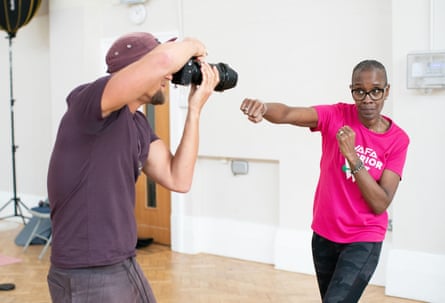
The atmosphere is fierce: as Lorraine Turner, 59, says: “I never used to think I was competitive, but later in life, I’ve realised that I am. I get a lot out of it if I push myself more.” Karen Silvestri, 60, remarks archly: “My husband’s a chef so I eat a lot and drink a lot. I still manage to retain this normal shape.”
Palmer’s daughter paid her a compliment on her butt the other day: “She said it wasn’t flat like a lot of women my age.” Downward comparison is very motivating, and it is also fun to watch when people are so unabashed about it.

“We’re a funny bunch, women, aren’t we?” Teresa Klasener, 61, says. She was very active until she got rheumatoid arthritis, then it all hit the skids until she started with Wafa two years ago. “We have all these mental blocks, we don’t prioritise ourselves, but once we’re in a group, we’ll fly.”
Jenkins says: “When I first became a personal trainer, I’d see a lot of women who were yo-yo dieters, and it was often because they were trying to be skinnier than their bodies were meant to be. I think exercise makes you confident in your shape as it is.” That might be the ultimate break with the visual norms of the fitness industry, that these are images of strength and exertion for their own sake, not for how they’ll make you look in spaghetti straps.
“I never knew what people were talking about with the endorphin thing,” Redford says. “And now, I do feel a sense of joy and self-congratulation, knowing that I just fucking went for it.”

